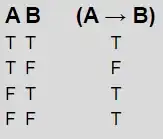I have the following logical implication
If John is a dragon, then everyone in town gets 1000 gold coins.
- p = John is a dragon
- q = Everyone in town gets 1000 gold coins
Now lets say John is NOT a dragon and still everyone in town gets 1000 gold coins. Does this prove that if John indeed was a dragon, then suddenly people wouldn't get their money? We don't know that. So if the only information we have is that $p$ is false and $q$ is true, we have to just accept that John being a dragon is something that would cause everyone to get 1000 gold coins.
We have no evidence to the contrary.
Is my reasoning and understanding of vacuous truth correct?

